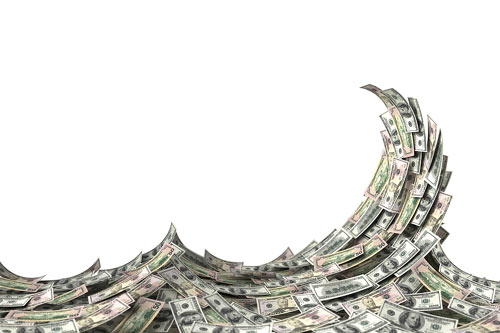
Democratic House candidates outraised their Republican opponents in nearly three-quarters of the 80 most competitive contests, according to Federal Election Commission data. But more than half of those candidates who outraised Republicans lost.
Moreover, a smaller share of the heaviest spenders in individual House races went on to win the election compared with the past three election cycles, according to data analyzed by the nonpartisan Center for Responsive Politics.
The figures offered a sign that the "green wave" of cash that flowed in for Democrats this election - much of it coming in increments of less than $200 - may have put more districts in play and generated buzz for underdog candidates, but may not have played as much of a role in electoral success as other factors.
"It was a midterm with record spending, but cash did not always equal success," said Sheila Krumholtz, CRP'sexecutive director. "It's just a wash in money. At some threshold, it no longer is so much about the money as it is about strategy, messaging, connection [with voters], charisma and organization."
Overall, $4.7 billion has already been spent on this election, Krumholtz's group said, surpassing previous congressional contests.
That includes the more than $1 billion raised by Democratic candidates' committees alone - more than a single party has raised in any election cycle - that they are expected to have spent. Outside groups on both sides raised massive amounts from wealthy individuals and spent more than $1 billion through a barrage of negative advertisements.
To be sure, many of the biggest Democratic fundraisers on the House side were crucial to the party's victory in winning control of the chamber.
Candidates like Colin Allred in Texas's 32nd, Abigail Spanberger in Virginia's 7th, Mikie Sherrill in New Jersey's 11th, Sean Casten in Illinois's 6th, Haley Stevens in Michigan's 11th, and Sharice Davids in Kansas's 3rd were among the party's most successful fundraisers who logged decisive wins Tuesday night byflipping Republican seats. Their victories were crucial to cementing the party's path to the House majority.
The Democratic Congressional Campaign Committee said the money raised by Democratic challengers allowed them to run extremely close races in deep-red districts and force Republicans to spend money on those races when they otherwise may not have. "Of course not every single Democratic is going to win . . . but tons did. We took the House!" said Tyler Law, DCCC spokesman, in an email.
Still, clear examples of the limitations of how far campaign money can take a candidate in their run for office also emerged shortly after polls closed on the East Cost.
For example, major Democratic fundraiser Amy McGrath ran an aggressive campaign against GOP incumbent Rep. Garland "Andy" Barr, but Barr edged her out by 3.2 points.
McGrath raised $8 million for her first-time candidacy in rural Kentucky, building a ground game in every county - a rare feat for a political newcomer in a district that President Donald Trump won by 15 points.
In her concession speech, McGrath said 90 percent of donations to her campaign came in increments of $50 or less, and encouraged her donors to stay civically engaged.
"Thank you to the hundreds and thousands of people who were actively a part of this campaign," McGrath said.
On the Senate side, Democrats raised more in small-dollar donations this cycle in their battle for the majority than the Republicans did in 2014, when the GOP last won the Senate majority, according to data from the nonpartisan Campaign Finance Institute.
Yet Senate Democrats still lost their fight, proving that small-dollar fundraising success tells one slice of the story.
In no Senate race was this limitation more evident than the contest in Texas between Sen. Ted Cruz, R, and Beto O'Rourke, who sought unsuccessfully to be the first Democrat since 1988 to win a Senate seat there.
O'Rourke set a new fundraising record for Senate candidates. Despite raising more than $70 million for his campaign - $38 million of it in small donations - he lost by 2.6 points.
"All the money in the world was no match for the good people of Texas," Cruz said in his victory speech Tuesday.
Still, O'Rourke's campaign expanded the Democratic small-dollar donor base and galvanized voters across the country, and likely helped with down-ballot Democratic races, said Guy Cecil, chairman of Democratic super PAC Priorities USA Action. The success of candidates like O'Rourke and McGrath will also help build the party's organization for the Democratic 2020 presidential race, Cecil said.
"If we are going to be a party that competes everywhere [in the country] - which is where our intention is - the only way to do that is with the enthusiasm and energy of small-dollar contributions," Cecil said.
Outside groups spent heavily to mixed success.
The Congressional Leadership Fund, aligned with House Republicans, spent $137.5 million - by far the most the super PAC ever spent in an election cycle - to mixed results in its fight to retain the House GOP majority.
For example, in California, the group spent $6.3 million to defend Young Kim in the 39th district, $5.7 million for Steve Knight in the 25th district, and $4.5 million to help Jeff Denham in the 10th district. Knight lost his seat to first-time Democratic candidate and major fundraiser Katie Hill, but Kim and Denham both held on.
On the Senate side, both the Democratic super PAC Senate Majority PAC and the Republican super PAC Senate Leadership Fund spent heavily in their fight for the Senate majority. SMP spent $110 million in support of Senate Democrats, and SLF spent $93.5 million to support Senate Republicans.
Despite SMP's work to defend Senate Democrats with the toughest reelection races, Republicans ultimately gained a net of two seats.
(COMMENT, BELOW)


 Contact The Editor
Contact The Editor
 Articles By This Author
Articles By This Author